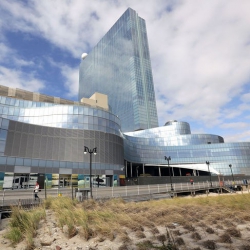Glenn Straub has a new plan for the Revel Building: use it to house Syrian refugees. Saying “we treat our dogs better than we treat Syrians these days”, Straub released a statement saying he would turn the building over to the United States government to use as a temporary shelter for the Syrian refugees.
It is a generous offer, though the U.S. State Department has ignored the suggestion to this point. Reports suggest that the State Department is aware of Glenn Straub’s offer. With immigration a hot-button topic in the presidential nomination process, the diplomats at Foggy Bottom are unlikely to want to bring in tens of thousands of Syrian refugees to the United States.
Straub’s Quote about Syrian Refugees
The statement from Glenn Straub said: “We treat our dogs better than we treat the Syrians right now. If the government wanted to house Syrian refugees, I’d give them use of the building and let them put those people there.”
Bankruptcy Cases
Glenn Straub is the Florida real estate developer who bought Revel Casino for $83 million earlier this year. Straub’s Polo North won the right to buy the property after outlasting a couple of rival bidders in Revel’s bankruptcy process.
Along the way, he has been canny about his ultimate intentions for the Revel Building, a 47-story skyscraper built from 2009 to 2012 at a cost of $2.4 billion.
Ideas for Using Revel Casino
Straub originally said he wanted to use the building as a railway link. Then he suggested he would build a college campus with a think tank for “geniuses” to brainstorm on the world’s problems. For the college campus, he planned to build an additional 35-story building on the same complex grounds.
Those weren’t the only ideas he had.
At other times, he discussed turning Revel into an indoor water part, an equestrian facility, and a medical tourism resort. On occasion, he’d even suggest he might establish a casino somewhere in the place. At a point last spring, he was discussing having smaller gaming operations inside the building, while offering space for other businesses.
No one besides Glenn Straub is really certain what the ultimate plan is.
Lawsuit with ACR Energy
That is not entirely the fault of Glenn Straub–or even mainly his fault. Such plans have been hard to put into effect, because Polo North is embroiled in a months-long legal battle with ACR Energy Partners over the cost of electricity for the building.
ACR Energy had a contract to extract $3 million a month from Revel Casino–one of the reasons the original business operation went bankrupt. The two rival bidders in the bankruptcy process also balked at the energy costs. After trying unsuccessfully to get ACR Energy to negotiate a new price, they pulled out of the process.
Once he won control of the Revel Building, Glenn Straub had a new plan which was much different than other potential owners: get a court injunction to negate the contract. That’s what he did, which is why the energy coop is suing to restore its original cost structure. ACR Energy Partners has told the judge it is likely to go bankrupt, if it must continue to supply electricity to Revel at the current price.
Through savvy and litigiousness, Polo North seems to be in a commanding position in the negotiations, but that requires a waiting game.
No Business until Lawsuits Are Settled
What the lawsuit has done is assure Glenn Straub cannot operate any business, until a resolution is reached. Thus, he might be thinking it would be worth his effort to house Syrian refugees, assuming he would be paid by the federal government for the accommodations. Or he might assume the offer is never going to be considered, but the mere mention of such a thing is good public relations.
In his public statement, Glenn Straub stated he did not want compensation for housing refugees, so his offer appears to be straightforward and altruistic. He only wants compensation for the expense of repairs and maintenance on the building while the refugees are living there–he wants to do it “at cost”, so to speak.
The Syrian Refugee Crisis
The Syrian refugee crisis is a serious human tragedy. It’s made all the more tragic by the fact most Western (European) nations are trying to keep the stream of refugees out of their countries.
After ISIS took control of large swaths of Syria and Iraq, refugees began to flow into Turkey. Turkey eventually tried closing its borders to the flight of people, so they began the harrowing journey overseas on hastily-found boats. Many paid smugglers to get them out of the country, leading to cynical attempts to exploit them.
Once they arrived in Greece, the financially bankrupt Greek government wanted them hurried out the country. As they reached areas like Hungary, locals feared the influx of Syrians would strain government budgets and hurt the local workers, who might have to fight for cheap jobs. Their reception was often inhuman, as evidenced by a female Hungarian journalist who tried to kick refugees as they walked past her. After losing her job, she’s now suing the refugee, blaming him for her own plight.
The incident is symbolic of the Syrian refugees’ terrible reception as a whole. Glenn Straub’s suggestion is thus a noble one, whether it is realistic or not.

